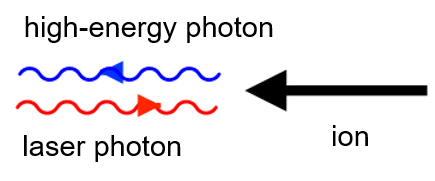| Program E01-1 | Fundamental aspects in generation of twisted gamma rays with ion beams |
|---|---|
| Principal Investigator | TANAKA, Minoru (Osaka University) |
The total angular momentum is decomposed into the orbital angular
momentum (OAM) and the spin angular momentum (SAM). The fact that
the electromagnetic field has an angular momentum was argued by
Poynting in 1909 and experimentally confirmed by Beth in 1936. It
has turned out that the photon, the quantum of electromagnetic
field, is a fundamental particle of spin-1 and Beth measured its
SAM. While it is well known that the multipole field has nontrivial
OAM. At present, in addition, light beams with OAM are realized in
the optical region, and their applications are widely studied. Such
light is called an optical vortex or a twisted photon because its
wavefront is a helicoid as shown in Fig. 1.
On the other hand, the development of light sources in the X-ray and gamma-ray regions are also active. In addition to the X-ray generation in the free-electron laser and the gamma-ray generation by the backward Compton scattering, the high-energy photon generation in the resonant absorption of optical laser light by accelerated partially-stripped ions and their successive deexcitations is also proposed. (See Fig. 2.) The benefit of this backward resonant Rayleigh scattering is its large cross section.
In this project, we theoretically study the generation of high-energy twisted photons with a beam of accelerated ions. Our goal is to clarify the advantage of ion beam over the proposed method of energy up-conversion using the backward Compton scattering of twisted laser and establish the principle of the method with ion beam.
Members
- Principal Investigator
-
TANAKA, Minoru
(Graduate School of Science, Osaka University)
- Research Collaborators
Reference Materials
-
M. Tanaka andN. Sasao , “New method of generating gamma rays with orbital angular momentum,” arXiv: 2102.00661 [hep-ph]


